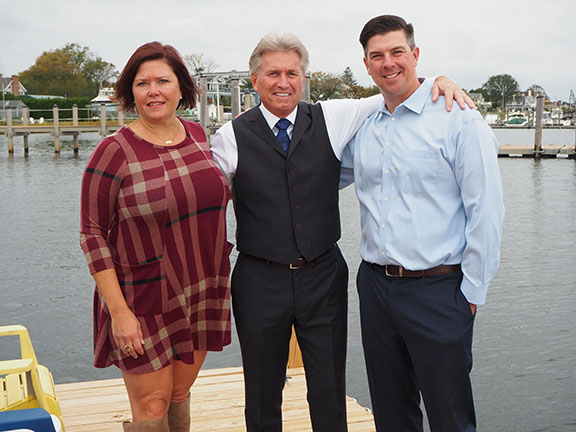
OCEANPORT – Councilman Joseph A. Irace said it’s ironic that the results of November’s general election will be reflected in 2020, the year of the borough’s centennial celebration.
“It’s a clear decision for voters,” Irace said. “Do you want to preserve the values our town has been built on for the last 100 years? Do you want to keep Oceanport ‘Oceanport’ and fight for what’s left of it? Or do you want to succumb to what’s being proposed down the road at Fort Monmouth and the unprecedented high-density developments that are unlike anything our town has ever seen before?”
Irace, referencing the mandatory 720 residential units sanctioned for the 430 acres of Fort Monmouth land that was zoned for Oceanport by the Fort Monmouth Economic Revitalization Authority (FMERA), is part of a Republican ticket that includes council members Steve Solan and Robert Proto.
Proto is making a run at the mayoral seat occupied by Democrat Jay Coffey, who won his four-year term in 2015 as an independent write-in candidate with support from key Oceanport Republicans, including Irace.
In May, following a period of uncertainty in which he told The Two River Times he would not seek a second term, Coffey once again placed himself in the race as an independent, this time on a ticket with former Oceanport Democrat vice chair Meghan Walker and Republican Tom Tvrdik.
“I think for us it’s a matter of approach,” Coffey said. “We’ll have a different approach than the other ticket. It’s a people-oriented approach and this way of thinking was inspired with how residents were treated (by certain council members) over the last year and a half. I’ve tried to distance myself from that.”
As mayor, Coffey has a seat on FMERA’s board alongside Eatontown Mayor Anthony Talerico, Tinton Falls Mayor Vito Perillo, Freeholder Lillian G. Burry and various other state officials.
Over the past year, tensions surrounding the fort’s development have heightened, with members of the Republican ticket accusing Coffey of being non communicative concerning fort affairs and butting heads with the FMERA board over projects that have gained approval, including the plan for a large-scale New Jersey City University satellite campus and 180 dwellings on 15 acres at the fort’s Lodging Area near Parker Creek, which was unanimously approved in June.
“We lost the battle to have control of zoning at Fort Monmouth 10 years ago when the FMERA statute was passed,” Coffey said. “Now these guys want to raise concerns about high-density housing going in, but it’s a simple math equation. There are three numbers that aren’t changing: 720 homes have to go in, 144 have to be affordable and you have 230 acres to do it because half of the acreage is zoned commercial. You’re going to have higher density than we’re used to. We have to work cooperatively to ensure it’s done right.”
Solan, the council president, agreed that decisions made at the fort need to be done intelligently and said the tentacles of those decisions extend beyond surface-level development and affordable housing mandates.
“The fort is going to be developed. But how do you want it developed is the question. Does the density need to be that high or do developers want to work with us to be community partners and scale back like Jersey City University, to their credit? If the density is too high, what is the impact on our police, fire and safety personnel, our maintenance workers, our schools? What about taxes? What about the PILOT (payment in lieu of taxes) sought by each developer that has come in over there? What will Oceanport look like in 10 years when FMERA is gone? Can we sustain and thrive with what they want to leave us with?”
Coffey credited his work with Sen. Vin Gopal (D-11) and Sen. Declan O’Scanlon (R-13) and the Monmouth County Freeholder Board for Fort Monmouth gaining a dozen liquor licenses, including two in Oceanport, a big win for the borough as it previously had none. Coffey said the combative nature of his opponents could strain working relationships he has built over the past four years with FMERA members, as well as those elected officials on both sides of the aisle.
Proto said the development of Fort Monmouth illustrates the difference of philosophies between these two groups of candidates.
“Voters are going to be given a very clear choice. Myself and my running mates, we have a record of being fiscal conservatives. Jay and Meg Walker, they are far-leaning left. And they’ve been claiming that partisan politics don’t matter at local level, that there’s no Democrat or Republican way to fix a pothole. And I disagree. We would patch the pothole. They would repave the entire road and then build high-density housing on either side of it. You’re talking about two distinct approaches to the handling of our taxes, over-development, the ability of residents being able to afford to live here and our quality of life.”
Walker, a member of the Oceanport Board of Education, said she won’t pretend to be an expert on the development of the fort, but instead believes the election is centered on three pillars that inspired her to run.
“This election is about regaining a respectful governing body and replacing the combative tenor that’s been created. It’s about being responsive to residents and not disregarding them when they don’t see eye-to-eye with you on maintaining a recycling center or keeping an environmental commission. And It’s about our governing body not being representative of our population,” Walker said.
Walker said neither she, Coffey nor Tvrdik have relinquished their national political views, but the decision to run as independents was a statement about the local political arena.
“There’s no place at the local level for partisanship and pitting community members against each other. The three of us have differing viewpoints on national issues, but it has no bearing on our town when you’re focused on fixing parks, roads and supporting our volunteers. On our board of education, when we’re tackling budgets and referendums, we do it with Oceanport values in mind. Not political values. I would love to see our governing body become that,” Walker added.
Tvrdik, a lifelong resident of Oceanport and a longtime borough volunteer, builder and realtor, said change is certainly coming to the borough, but the most important alteration is inclusion in the decision-making process.
“There needs to be open dialogue so we can come to conclusions that make the most sense for Oceanport. There are a lot of issues facing this town beyond the fort. We’re in the process of rebuilding schools. People need to be able to come to meetings, ask questions and have conversations with no fear of engaging the council. I believe everyone on both sides wants what’s best for the town. But there’s a better, more engaging way of getting there. Change is inevitable and we have to put ourselves in the best position to prepare for it,” Tvrdik said.














